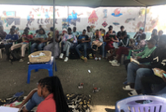Swali: Je, umejifunza zaidi kutoka kwa wazazi wako ama kupitia uzoefu wako ulimwenguni?
Methali hii hutumika wakati mtu amekosa na kupata madhara, haswa kama ameonywa... kama vile dereva wa lori katika picha hii (kutoka Oxfordshire, Uingereza). Bila kujali kama ulifunzwa na wazazi, hatimaye lazima ukabiliane na ukweli wa maisha halisi. Ona pia:
Mtoto akilia wembe, mpe
Zama walinipumbaza, wazee kwa kunilea,
Nikashindwa kujifunza, myendo mipya ya dunia,
Leo najipendekeza, kwa walimwengu sikia,
Asofunzwa na wazazi, hufunzwa na walimwengu.
Kazi zote singeweza, bila kuwanyenyekea,
Kutii kuwembeleza, kisha kuwatumikia,
Hata nikawapendeza, wakanifunza kwa nia,
Asofunzwa na wazazi, hufunzwa na walimwengu.
Sasa kusema naweza, Kizungu bila udhia,
Kama vile Kingereza, na lugha zingine pia,
Kwa juhudi najifunza, hata zimenielea,
Asofunzwa na wazazi, hufunzwa na walimwengu.
Naweza kuzungumza, pasipo kutia doa,
Na paovu kuongoza, doa nikaliondoa,
Mwishowe pakapendeza, lingano moja hatua,
Asofunzwa na wazazi, hufunzwa na walimwengu.
Sina nilipopasaza, pasina kupachungua,
Pande zote hachunguza, marifa nikachukuwa,
Hata najua kuuza, bidhaa na kununua,
Asofunzwa na wazazi, hufunzwa na walimwengu.
Kiasi nilo jifunza, si haba kwa kubabia,
Nitokapo napendeza, kazi njema natumia,
Ni vigumu kuibeza, jinsi inanielea,
Asofunzwa na wazazi, hufunzwa na walimwengu.
Haifai kupuuza, kwa kitu usicho jua,
Jaribu kupeleleza, na kisha ukichungua,
Nia unap,o ikaza, hushindwi kitu kujua,
Asofunzwa na wazazi, hufunzwa na walimwengu.
Kazi nilizojifunza, babangu hakuzijua,
Hakujua Kingereza, kuuza na kununua,
Bali kujipendekeza, ndipo mwana nikajua,
Asofunzwa na wazazi, hufunzwa na walimwengu.
Nawatilia nyongeza, mlio nisaidia,
Nyote mlionifunza, Rabi awape afia,
Mungu heri tawajaza, mema kuwarudishia,
Fikeni E. M. K. Senkoro (1988) aliandika juu ya shairi hili:
[M]tu hawezi kupata uzoefu wa mambo yote yahusuyo maisha kutoka kwa wazazi wake: lazima awe tayari kufunzwa na ulimwengu, yaani kujifunza kutoka kwa wengine zaidi ya baba na mama yake.
Nimejitahidi kutafsiri
shairi hili kwa Kiingereza, na nitashukuru sana sana kupata feedback zenu, ndugu wajuaji wa Kiswahili na Kiingereza. (Someni
hapa.)
Mnafikiriaje? Shairi hili lina maana gani kwako?






















